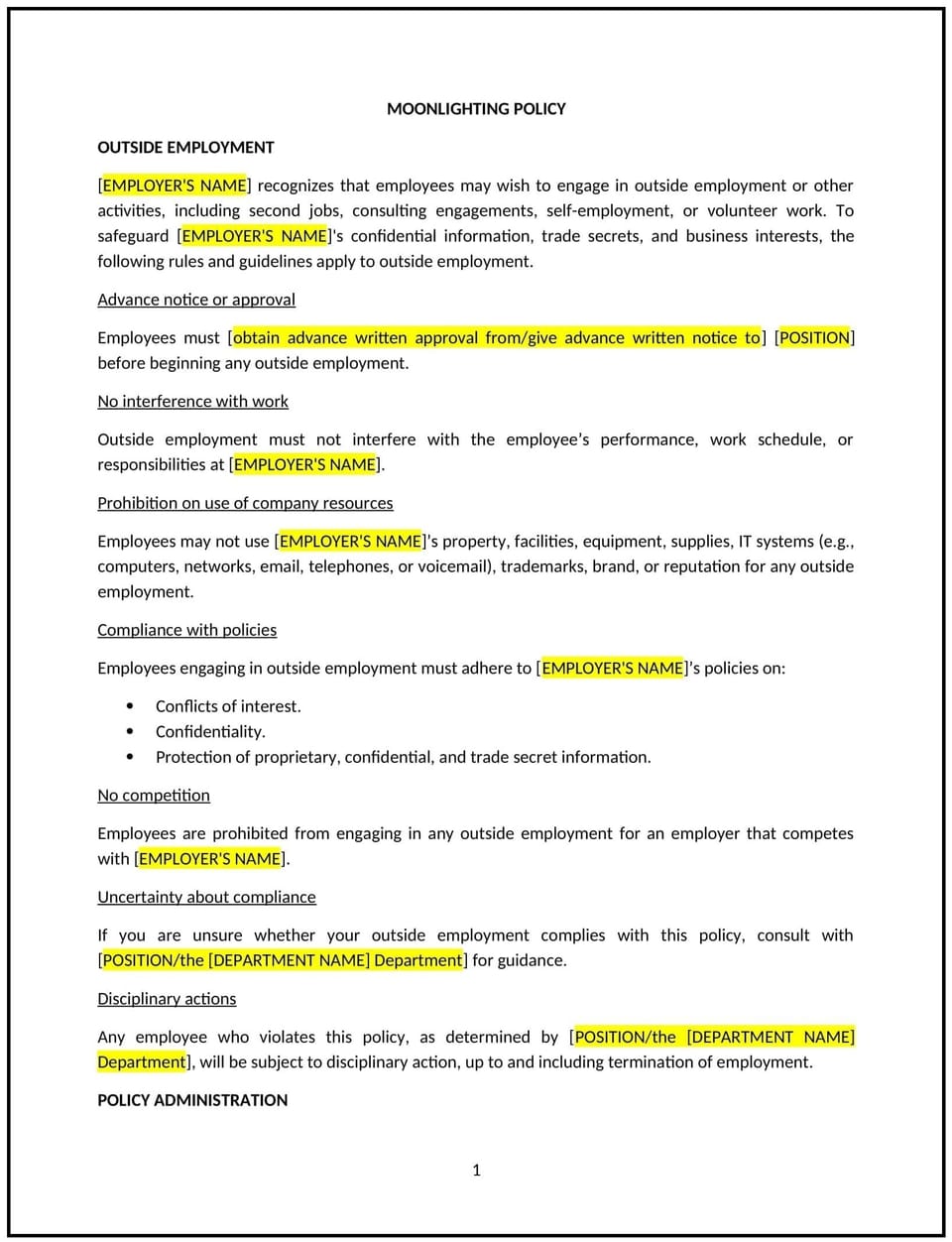Moonlighting policy (Vermont): Free template

Moonlighting policy (Vermont)
This moonlighting policy is designed to help Vermont businesses manage potential conflicts of interest and ensure employees’ secondary employment does not interfere with their primary job responsibilities. It establishes guidelines for disclosing and approving outside work while maintaining productivity and company integrity.
By adopting this policy, businesses can safeguard operational efficiency, address potential conflicts, and promote transparency.
How to use this moonlighting policy (Vermont)
- Define moonlighting: Specify what constitutes secondary employment, such as freelance work, part-time jobs, or consulting roles outside the company.
- Include disclosure requirements: Require employees to disclose any secondary employment to their manager or HR for review and approval.
- Address conflicts of interest: Prohibit outside work that competes with the company, uses company resources, or creates a conflict of interest.
- Emphasize performance expectations: Clarify that moonlighting must not affect employees’ ability to meet their primary job responsibilities or performance standards.
- Include approval processes: Outline steps for requesting approval, including providing details about the nature of the outside work.
- Monitor compliance: Ensure that secondary employment arrangements are reviewed periodically to align with company policies and Vermont laws.
Benefits of using this moonlighting policy (Vermont)
This policy provides several benefits for Vermont businesses:
- Reduces conflicts of interest: Ensures secondary employment does not interfere with company operations or objectives.
- Promotes transparency: Encourages employees to disclose outside work for evaluation and approval.
- Enhances compliance: Aligns with Vermont employment laws and workplace standards.
- Protects productivity: Ensures employees prioritize their primary job responsibilities.
- Strengthens trust: Demonstrates the company’s commitment to fair and consistent practices regarding outside work.
Tips for using this moonlighting policy (Vermont)
- Communicate the policy: Share the policy with employees during onboarding and include it in the employee handbook or internal systems.
- Provide examples: Clarify what types of secondary employment may or may not be acceptable under the policy.
- Document approvals: Maintain records of disclosed outside work and management approvals for accountability.
- Encourage open communication: Foster a culture where employees feel comfortable discussing their outside work arrangements.
- Update regularly: Revise the policy to reflect changes in Vermont laws, workplace practices, or company needs.
Q: Why is a moonlighting policy important for businesses?
A: A moonlighting policy helps businesses prevent conflicts of interest, maintain employee productivity, and protect company resources.
Q: How should businesses evaluate outside work disclosures?
A: Businesses should assess disclosures for potential conflicts, such as competition, resource use, or impact on job performance, before granting approval.
Q: What are the risks of not having a moonlighting policy?
A: Without a clear policy, businesses may face issues like reduced employee performance, misuse of company resources, or legal conflicts related to secondary employment.
Q: How can businesses monitor compliance with this policy?
A: Businesses can review disclosed outside work periodically, track approvals, and investigate concerns about conflicts or performance issues.
Q: Can businesses prohibit all secondary employment?
A: Generally, businesses cannot outright prohibit secondary employment but can restrict work that creates conflicts of interest or impacts job performance.
Q: What steps should be taken if a conflict of interest arises?
A: Businesses should address conflicts by discussing alternatives with the employee, such as modifying the secondary employment or discontinuing it.
Q: How often should this policy be reviewed?
A: This policy should be reviewed annually or whenever significant changes occur in Vermont employment laws or company operations.
Q: Does this policy apply to contractors and part-time employees?
A: Businesses may apply this policy to contractors or part-time employees if their roles involve access to sensitive information or potential conflicts of interest.
This article contains general legal information and does not contain legal advice. Cobrief is not a law firm or a substitute for an attorney or law firm. The law is complex and changes often. For legal advice, please ask a lawyer.


